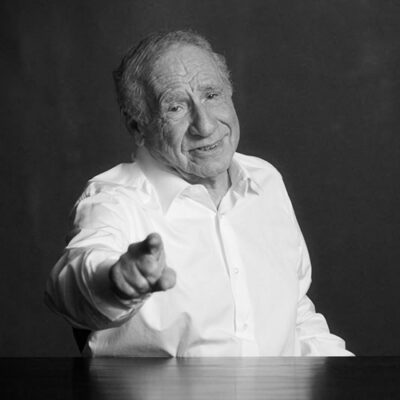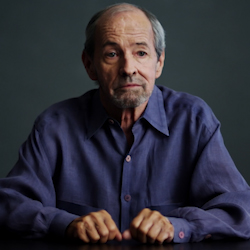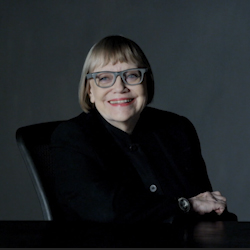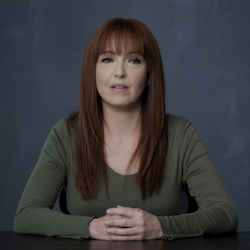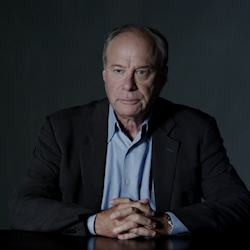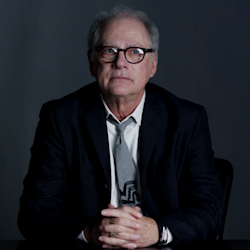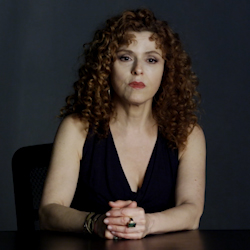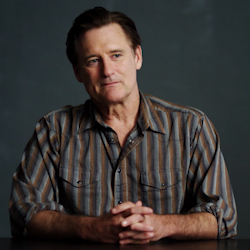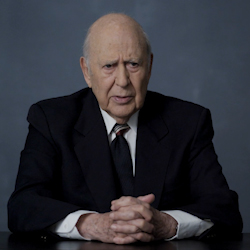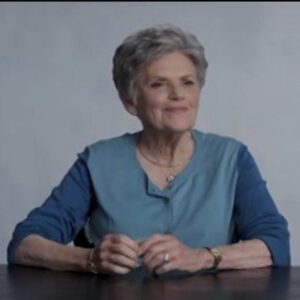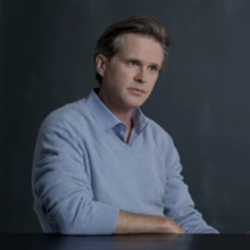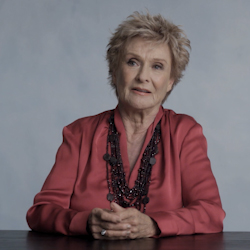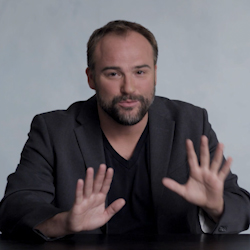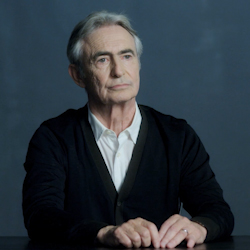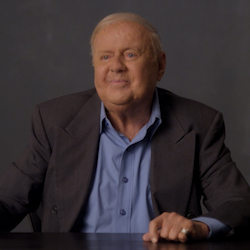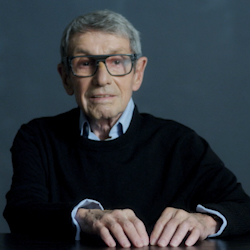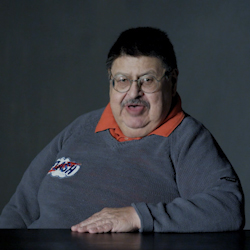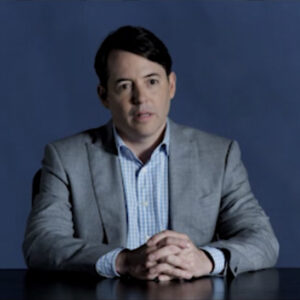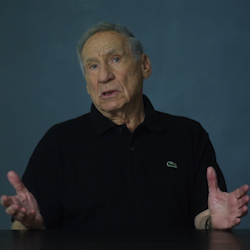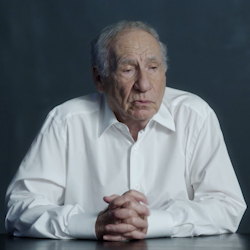Interviewer: How did you get hired for My Favorite Year?
Richard Benjamin: How did I get hired for My Favorite Year? I was in New York and doing something with my wife there, and my agent called and said that Mel Brooks and Michael Grosskopf were sending a script and they were interested in me doing it. I had done a television pilot directing and I had done some other stuff. And I guess I sort of met Mel at some point. And anyway, I read it and I said, you know, well, this is amazing. How did this happen? And I got back here and we met at my house and we just, you know, hit it off. And also My Favorite Year is so much about your show of shows and Sid Caesar and all of that. And that was a show that I loved as a kid. And in fact, my friends and I would do all the skits the next day on the phone that we saw. And they were all, you know, from these incredible writers, Mel and Neil Simon and Woody Allen’s unbelievable Larry Gelbart anyway. So I. I knew all of it. I knew what it was and everything. And we just all hit it off. And they hired me. I mean, it’s pretty, pretty amazing and lucky.
Interviewer: Because it was. The material was so close to him. Was he at all in the script process or before you shot was he at all protective of the characters or situations because he was so close to the material?
Richard Benjamin: No, no. He he wasn’t even around very much unless we needed him. And Michael Grosskopf, who, as I say, was one of the producers said I said, when do we get to use Mel? You know, when we need Mel. And he said, you you only get Mel when you need him. And now we started to go in to production and get ready to shoot and everything. And before we started to shoot. We are doing a budget and I realized we need more money. We haven’t got enough money to do the picture the way we want to do it. So I called Michael and I said, OK, we need him. So he’s a world called him up. And I called him and I said, Mel, I need you. We need three hundred thousand dollars to really do this. Right. We’re short that amount of money. So I said we have to meet with David Begelman, who was the head of the studio, and try and get this money. So I said, let’s call him and make an appointment in his office. And he said, no, no, no office. We don’t go into any office. You go into an office, you don’t get anything. They take phone calls, they don’t pay attention. They go to another meeting. We’re gonna meet him in the hallway. He said the way to do this is you go in to, you ambush him. You can’t set up any meeting. He’ll ask what it’s about. And we won’t get the money. So I said, OK, where in Ohio is that? We’ll get him in the hallway. And I said. On his way to lunch, he said, What’s the matter with you? What are you talking about? You don’t know anything. Not on his way to lunch after lunch. He’s gonna be hungry. He’s not going to listen to us. We get him when he comes back. He’s a little logi. He’s eaten. And we we get we go into the hallway and we ambush him. OK, I hadn’t heard about this in film school or anywhere else, but. All right. And sure enough, he coming down the hall at MGM and Mel grabs him and starts entertaining him and Mel starts telling him a couple of jokes. He’s laughing. He’s having a good time. We’re moving. We’re moving all this time. We got it. We know that this is has to happen before he hits the office. And now Mel is doing a couple of jokes. He’s laughing. He’s having a good time. Mel does a little song in the hallway. It’s quite a performance. And at the end of it, I think he actually was dancing. And so then he says to him, just as we hit his office, it always is. David, how much are you gonna cash on you? And he said, why. Well the kid that was me, the kid. The kid who needs three hundred thousand dollars to finish the picture. So I’m watching all this like it’s science fiction or something. And George Justin, who is the head of production, is also in the hall. He grabs him and he’s laughing because Mel is doing stuff and he said they need another three hundred thousand dollars. Is this is that right? George Justin says, yeah, they do. He said, give it to them. And now he’s not laughing as much as he was laughing before, but he’s still kind of laughing. And then he said, OK. And then he turns and he looks at us like he doesn’t quite know what’s happened and he’s not laughing quite as much as he was before. And he goes into his office and I. Say to a Mell for what happened here, he says this is a way to have to do it. And he said his art, do you need anything else? And I said, no, not today. And he said, OK, if you need anything, you know where to call. And he’s gone. He’s gone. Like Lamont Cranston, the shadow, he is easy. He’s there and he’s not there. So I thought, well, you know, I thought making movies was gonna be one kind of thing. But with Mel, it’s another kind of thing. He’s like a guided missile, a show business guided missile. We got the money.
Interviewer: You wanna take a sip of water? That was great. And then. You are just a little bit just on the edge. It was out. Yeah. OK, so now let’s talk about casting Joe Bologna.
Richard Benjamin: Oh, yeah. OK. So now it’s casting. Again. I say to Mel, we’ve cast Peter O’Toole in the air of Alan Swann part. And now we have to cast the Sid Caesar part, King Kaiser. And he says, Joe Bologna, get Joe Bologna. He’s the only guy to get. He’s the one. Get him. So I. OK. I thought Joe was great and I did think he’d be perfect for it. So we call his agent and about a hour or so later, his agent calls back, says, thanks very much. Joe is passing. But thank you for the offer. So I call Mel. I said, well, he passed. We have to go on to somebody else. He said, no. I said, What do you mean? He said, that’s unacceptable. I said, What do you mean unacceptable? He said, it’s unacceptable. He said, Call him back. I said he call him back. I called Joe. Joe, hi. You know, we’re doing this picture, I know your agent talked to you and she we’d love you to do this part. And he said, thank you so much for calling and I appreciate it. But as I told my agent, I’m I don’t want to do it. Thanks very much. I’m passing, but thank you. And he hangs up. I call him. And he said I talked to him personally and he he said, thanks very much, but no thanks. He’s passing. I said, we have to go to somebody else. He said, unacceptable, unacceptable. Now he’s getting a little agitated. He’s standing at this point. I’m in his office. And he said, call him back. And I said he his agent said no. He said, no, I we have to find somebody. It’s unacceptable. And he’s actually kind of up in these kind of on the balls of his feet and everything. I said, OK, OK, call him back. I said, OK. I call him back and I said, Joe is sorry, it’s a little embarrassing. But Mel asked me to call you again. I know you said no. And he said, you know, Dick, thanks very much. He said, absolutely not. Please don’t call me again. It’s getting embarrassing. Don’t call me. I called Mel and I say Mel, he said, don’t call him again, like ever again. And he said it’s unacceptable. It’s unacceptable. Wait two days and call him. I said Mel we have to start. We shoot and we have to get somebody unacceptable. And he hangs up the phone and he. I wait two days and I think this is nuts. I call them up and I said, Joe, it’s Dick and. You know, I feel bad about this, but we’d like you to do it. He said, sure, when do we start? I said what, he said, I’d love to do it. Thanks very much. O kay. I called. I said Mel. He said, yeah, this is their actors. He said, these are actors. You can’t take no for an answer. They want to act. You waited the two days. He said perfect. OK, what’s next? So, I mean, these are they were like learning experiences that are not going to be taught in film school. These are things that could only get well there, the Mel school. And it’s quite effective and it works.
Interviewer: And now it is. You had a script meeting with him. What was it supposed to go for.
Richard Benjamin: Two days.
Interviewer: So tell.
Richard Benjamin: Oh, yeah. Two days. So when we finished, Norman Steinberg and I and Norman all wrote the script. Norman Steinberg and I are promised two days with Mel. We’ve now gone over the script from months. And we just want that Mel kind of expertise and polish and brilliance. And he said, yep, two days, two days and you’ll come to the house. And that’s the clip.
Interviewer: I’m sorry. Start again and we’ll leave the clip.
Richard Benjamin: Yeah. So, Mel, we’re gonna get two days with Mel to just polish off the script and get the brilliance of Mel. The Mel pass at this script. So he said, I’m gonna give you two days. I said two days. Well, I’ve never seen him stay in one place longer than ten minutes. So I thought, this is pretty amazing. So we get to the house and as we get to the house, he’s coming out and he he’s got his dog. I have to walk the dog. I’ll be back. You guys go in there. So we go back and I’m thinking, uh-oh, he’s already gone. He isn’t even here now. And we just there he comes back with the ray said, all right. What is this? What is it? It’s the tooth, the beginning of the two. He said two days? Two days? There’s a problem with Fox. There’s there’s a conflict there. There’s there. I have to get over to Fox. There’s trouble. I said, how do you know there’s trouble over at Fox? I don’t know. There’s trouble, but what is it? So all of a sudden we’re now into what’s going to look to me like, I don’t know, an hour or something. What happened to the two days? And what does it give me? The script. So we give him the script and we start going page by, goes through the script, like you said that already. You don’t need that. That’s funnier than that. That’s make that the last joke. Put that joke over there. What’s this over here? That’s the same scene is over there. Put that scene over there. He said, okay. Is that it? I said, yeah. And it was brilliant. It was completely brilliant. It was about 45 minutes. And he said, I gotta go. He said, have a bagel, have whatever you want. I’m gone. And. It’s the Mel school. It’s the Mel school of script work and everything he did there was brilliant and worked and great jokes came out of that. And Norman and I were so kind of jazzed about this thing that we went into the parking lot outside of his house. And before we got in our cars, I don’t know, we wrote two or three the best jokes in the movie because we had this kind of Mel energy that was was all over the place. So. He infuses stuff with wonderful wit and an energy. You pick up his energy and it’s like playing tennis with someone you know real good. And the thing about him is that. You know, a mean, joke is easy. Mel does the harder joke. It’s the nice joke. It’s the human joke. It’s the joke that has kindness and gentleness in it. The truth in it. Humanity in it. That’s harder. That’s harder to do. And he also projects the sense of happiness. And I think that that’s what makes an audience smile between the jokes. It’s OK. You know, to get big laughs with jokes, it’s what’s happens in between there and in between. There is a happy fondness and a joy of being with these people. And he infuses everything with with that. And there’s somebody I don’t know if many people remember him, but he reminds me of somebody from a long time ago, Jimmy Durante, who it’s hard to compare Mel to anybody, but to just Jimmy Durante, who. If you see any of his things, it’s only happy. There’s nothing sad and down or mean. And that’s Mel. I remember he told me one time and he said, you know, this isn’t show business, it’s show business, which means he knows that part of it, too. He knows that you got to make something and you should be making something that people like and that they want to go see. So. He’s certainly one of a kind, there’s no question of that.
Interviewer: You also mentioned that the day before, you should tell us that story, the day before shooting began, Begelman called him.
Richard Benjamin: Oh, yeah. The day before shooting, Begelman called him and said, Tell me again why we’re letting Benjamin direct this movie. It was my first movie. And he said, well, we think he’s sane. So then Mel called me and they said, Begelman, just call me and ask me why we’re letting you direct this movie. And I told him, we think you’re sane. And I said, Oh, well, thank you. And he said, well, I mean, you’re an actor, so you’re going to have to act sane during this. I said, all right, I think I can do that. That first movie, it being my first movie and being able to work with Michael Grosskopf and Mel was an incredible way, you know, to start a directing career. I must say.
Interviewer: So he really didn’t come on set?
Richard Benjamin: No, no, he come to dailies and he. I I liked it when he laughed in the dailies. But, no, he was he wasn’t on the set. He never was on the set.
Interviewer: In planning it, did you talk to all the guys from Caesars writing room or.
Richard Benjamin: Mm hmm. No, I showed them some of them the movie after and I and I actually have seen Sid Caesar a number of times in the last few years, but we showed it to Sid Caesar and he liked it. But I didn’t talk to anybody beforehand. The thing itself was kind of complete because of what I already knew about that show and what that movie was about. About live television. And new there was there was something new happening. It wasn’t guys standing up telling jokes. This these were sketch long sketches of kind of life and death situations that were funny because they weren’t happening to us. They were happening to them. They were behavior. It was behavior, humor. And it’s something that changed everything. It’s something that I respond to.
Interviewer: You know, going on with that. What you notice is an especially Mel’s skits and Mel’s way of thinking.It’s not situational comedy. It’s not my mother in law. The kids are driving me crazy. My job. It’s. I don’t know how you describe it’s almost surreal the way the mind works, you know, because it’s none of those situational. Hee doesn’t traffic in those situational concerns at all. It’s.
Richard Benjamin: No.
Interviewer: And even the skits on your show of shows were bizarre in a fantastic way.
Richard Benjamin: Yeah, well, it’s like it’s it’s like The Producers, which has a great, great premise there. These guys betting on a failure and being deliriously happy because they know they got the worst show in the world. Which, of course, turns into this this hit. It’s a great original idea. And even in my favorite year, one of his jokes. When? When. O’Toole the Alan Swann.
Interviewer: Because your other clip.
Richard Benjamin: My other clip is gone.
Interviewer: That’s fine. Just say so, you can pick it up from in my favorite year.
Richard Benjamin: Yeah. One of the one of the great jokes in my favorite year is a male joke, but it’s got the truth in it. When Alan Swann, the O’Toole character, comes to Benjy’s house for dinner and of course the neighborhood goes nuts and the ant from upstairs comes down to dinner too and opens the door. And she’s in a 1920s wedding dress. And Lainie Kazan playing the mother says, Oh, Sadie, you know, what a lovely dress. And she says, yes, I. And she let me go back. She says, as I think Sady right. Sady what a lovely dress. She said, yes, and I only wore it once. That’s a Mel joke. But it’s also the truth and. For something to really be funny, I think it has to be true.
Interviewer: Could you speak more to this. He wasn’t like the other kids, meaning his is mental. You know, where he went with the comedy is not because even. And. I mean, even Carl, you know, with the Dick Van Dyke shows it took even though that’s such a unique premise too bet it is. There’s the wife and the kid and it’s a situational premise. Whereas Mel just never. The jokes were never mean and they weren’t. They were sort of ripped off of what you’re saying, the truth or his history or literature.
Richard Benjamin: Yeah.
Interviewer: Things Like that.
Richard Benjamin: Yeah. Yeah.
Interviewer: It’s it’s. People always talk about Lenny Bruce, but as I’m getting into this, you’re thinking like this is a really unique vision that from from your show of shows when he’s a teenager practically writing it off.
Richard Benjamin: Yeah, yeah. Well, you know, it’s something that can’t be. You know, I don’t think you can talk about comedy. I think there are funny people and not funny people. And. He sees things in a unique way. He’s always fun and funny to talk to. But there’s you know, real intelligence behind all of that. I mean, it’s not for, you know, for me to say, you know, he’s one of the smartest people I know. I mean, OK. That’s that’s that’s a fact. And but I think also. There’s that sense of goodwill, which I think is very, very important. You get a lot you get a lot out of that of approaching things in that kind of positive way. But he’s unique. He is. He’s he’s unique.
Interviewer: You think that’s why the movies have staying power? Because it’s a positive.
Richard Benjamin: I think so. I think so. I know when you’re in your when you’re in his company, your game goes up. You if you start to bounce with him, you’ve got to kind of stay up with him and your own game goes up. But how do you know how do you how do you. I don’t know if you can get in there at all. It is something unique. Is there someone else? There’s no one else like him. But in that happiness thing, I think that’s that’s a big thing. And a sense of wanting to entertain where all that comes from, from, you know, all of us who do this. I mean, there’s always been all those explanations and everything, but I don’t think they lead anywhere to tell you the truth.
Interviewer: I think I think we’re good.
Richard Benjamin: Yeah.
Interviewer: Yeah.
Richard Benjamin: Was that all right about. I could do that. About the Begelman thing was that alright?
Interviewer: Do it one more time.
Richard Benjamin: Yeah, I think so. Yeah, I’ll do it.
Interviewer: Alright. So Begelman from the begiinning.
Richard Benjamin: Yeah. Michael Grosskopf told me, when we need Mel, I said to Michael Grosskopf. When do we not wait?
Interviewer: When we get Mel.
Richard Benjamin: Yeah. Do we need Mel? What happens if we need Mel? He said, you just call him. And I said, Okay, I think we need him. Why? Well,.
Interviewer: I think you look at me with look. What happens when we need him.
Richard Benjamin: I said to Michael Grosskopf, what happens when we need Mel? So he said, you just call him. I said, okay, I think we need him. Why? Well, we’re short three hundred thousand dollars in the budget. We have to get three hundred thousand dollars from the studio. So MGM. So he says, OK, call him. I said we need to get 300,000 dollars for the picture to work right. And he said, OK. So I said, I’ll call Begelman. David Begelman, who’s head of MGM, and I’ll set up a meeting for us in his office. He said, no office. I said, what? He said, no office. You can’t do it in the office. They take phone calls. They don’t pay attention to you. They go to another meeting. We’ll get them in the hall. I said, What are you talking about? He said, you get them in the hall when they’re going somewhere. Coming back, I’ll show you. So I said, okay. When is that gonna be? He said, around lunchtime. I said, When are you on his way to lunch? He said, No, you dope. Not on his way to lunch. He said that he’s gonna be hungry. He’s not gonna listen to us. Waili has lunch. He’s eaten a nice big lunch. We get him on the way back. I said, I see. OK, so here comes Begelman down the hall. Mel grabs him. Hi, David. How you doing? Tells them three or four jokes. David is laughing. Have a nice time. He said, have you heard? Here’s a little song and he sang that sings a little song, something about movies and MGM and Hi David Begelman, something like that. And then I actually think he was dancing a little bit in the hall and we get down towards his office to be offices. Have you got any cash on you? And he says, Why? He said, The kid here, I’m the kid. The kid here needs three hundred thousand dollars to finish the movie. Really, George Justin in production, guys in the hall, he says, is that true? And he said, yeah. He said, all right, give them the money. And he’s laughing. And then he’s not laughing quite as much. And he’s got a look on his face like what happened here? And he’s in his office. And Mel says, Disney, anything else? And I said, Not now. He said, OK, just call me. He’s gone. It’s like Lamont Cranston, the shadow, and he’s gone. He was there. Now he’s not there. It’s the Mel School of how to make movies.
Richard Benjamin: Better.
Interviewer: Yes. I lost you the last quarter. Well, we got it.
Richard Benjamin: Do you want to do the Bologna one again?
Interviewer: Sure, sure. You got it from the main and then. Ok so do the Bologna one.
Richard Benjamin: OK? So here’s the middle school of casting. We had O’Toole playing the Errol Flynn part. We need King Kaiser, the Sid Caesar part. He says get Joe Bologna. He’s the best one for that. Get him. I said, OK. And I agree with you. Yes, OK. Call his agent. Agent calls back, says he passed. Thanks very much. I call Mel. I said we have to go to somebody else. He’s away. He said he passed. He said unacceptable. It’s unacceptable. What do you mean he’s. You call him. So I call him up and I say, Joe, I know your agent called you and you pass. But, gee, we’d love for you to do this. And he said, thanks very much for calling, but I don’t think so. But thanks very much and good luck with the picture. I call him back. Mel. Joe thanked us for calling him, but passed again is unacceptable. Unacceptable. I said he’s a calling back. I said, Mel. He said, call him back. So I call him back and I say, Gee, Joe, I know this kind of embarrassing, but, you know, we really want you to do this. And he says, Dick, really? He said, I want to tell you this. Thank you very much. But I absolutely I’m not doing it. And please don’t call me again. I said, OK, goodbye. And I call Mel. And I said, OK. I called him. And this time he said, absolutely not. Unacceptable. Unacceptable. And now he’s jumping up and down. I can hear him in his office actually out of the seat, jumping up and down. Wait two days and call him. I said Mel. Wait two days. Don’t call them a day from now. Wait two days and call him. OK. I sit there, I wait two days, I call them up and I say, Joe, hey, I know we’ve spoken about this and gosh, we’d love. We’d love for you to do the movie. So when do we start? I’m in. Oh, OK. Thanks, Joe. God, this is going to be great. Thank you. I said Mel, I called him and he’s in. He said, sure, absolutely said that’s the Mel School of casting.

